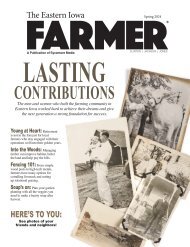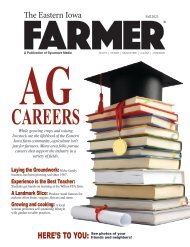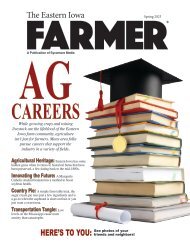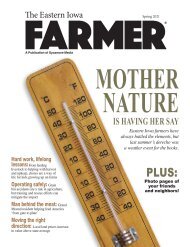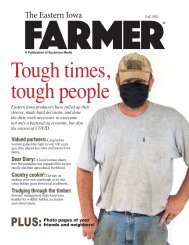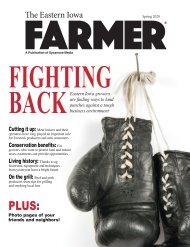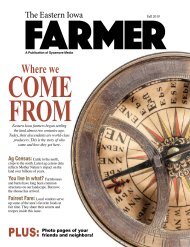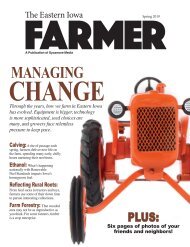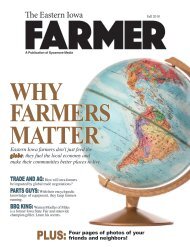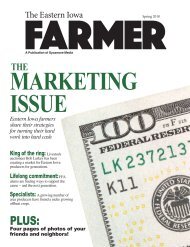Create successful ePaper yourself
Turn your PDF publications into a flip-book with our unique Google optimized e-Paper software.
FOR THE BIRDS<br />
About Avian Flu<br />
Avian influenza (AI) is a viral disease<br />
that mainly affects birds. The virus occurs<br />
as both low pathogenic (LPAI) and<br />
highly pathogenic (HPAI) forms based<br />
on how sick they make poultry, such as<br />
chickens and turkeys.<br />
Chickens and turkeys with LPAI may<br />
not show any signs of illness or they<br />
may show mild signs such as sneezing,<br />
coughing and discharge from their eyes<br />
or beak.<br />
Chickens and turkeys with HPAI may<br />
have difficulty breathing or die suddenly.<br />
Waterfowl, such as ducks and<br />
geese, can naturally carry LPAI and<br />
most commonly do not show any signs<br />
of being ill.<br />
Domestic poultry that become sick<br />
with LPAI may display:<br />
n Minor sneezing or coughing<br />
n Minor discharge from eyes or break<br />
n Decreased food and water intake<br />
n Decreased egg production<br />
n Deformed eggs<br />
If wild ducks and geese come into<br />
contact with chickens and turkeys they<br />
can give them LPAI.<br />
Once chickens and turkeys are infected<br />
with LPAI, there is a chance the disease<br />
can become more severe, changing<br />
into HPAI. Domestic poultry that<br />
become sick with HPAI may display:<br />
n Severe lethargy<br />
n Severe difficulty breathing<br />
n Blood-tinged discharge from<br />
eyes or beak<br />
n Unfeathered skin appearing<br />
blue on the head, comb and wattle<br />
(and snood in turkeys)<br />
n Swollen combs, wattle or shanks<br />
n Decreased food and water intake<br />
n Decreased egg production<br />
n Deformed or shell-less eggs<br />
n Sudden death<br />
Source: Iowa Department of<br />
Agriculture and Land Stewardship<br />
Taking extra precautions<br />
Poultry producer Abe Vickers of Grand<br />
Mound said the bird flu means taking<br />
extra precautions around the farm and<br />
making sure that visitors are aware of the<br />
risk they pose to the flock and his show<br />
season.<br />
“When visitors come to our farm, they<br />
are not allowed inside the coop,” said<br />
Vickers, who is a DeWitt Central FFA<br />
member. “We do not know what might be<br />
on their shoes, and we want to minimize<br />
the exposure to outside foreign bodies.<br />
We also take special precautions when we<br />
enter our own facilities including making<br />
sure that we have clean shoes on or that<br />
we wash our shoes before going inside.”<br />
Vickers says that these changes to the<br />
management of their flock are likely to<br />
be permanent along with the continuation<br />
of veterinary checks for poultry prior to<br />
entering the fairgrounds. He thinks that<br />
increased diligence will ensure that flocks<br />
stay healthy. He believes that as producers,<br />
he and his family play a role in that.<br />
“We take the safety of our animals<br />
WELTER SEED<br />
& HONEY CO.<br />
OFFERING THE WIDEST SELECTION<br />
OF SEED IN THE TRI-STATE AREA<br />
• Alfalfa<br />
• Pasture Mixes<br />
• Corn<br />
• Soybeans<br />
• Small Grains<br />
• Lawn Seed<br />
• Cover Crops<br />
• Custom Mixes<br />
• Seed for CRP<br />
• Pollinator Mixes<br />
Celebrating<br />
Over 65 Years<br />
in Business!<br />
17724 Hwy. 136 • Onslow, IA • (800) 470-3325<br />
www.welterseed.com<br />
24 EASTERN IOWA FARMER | FALL 2022 eifarmer.com




